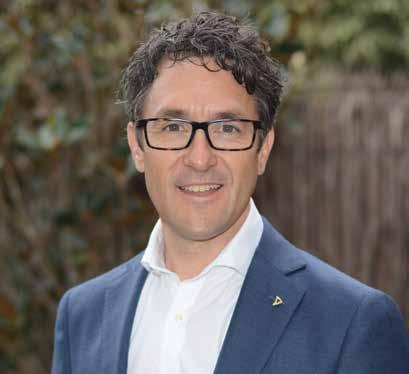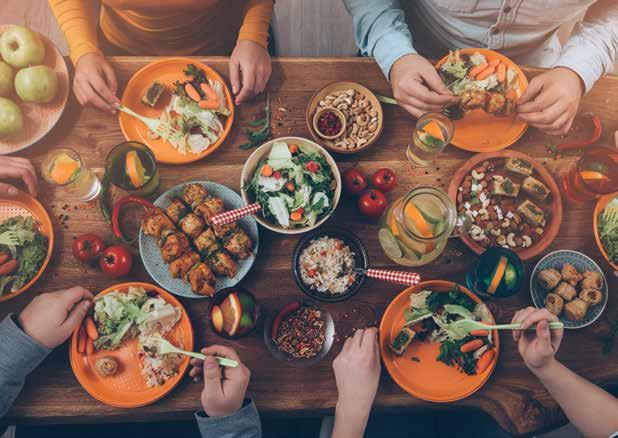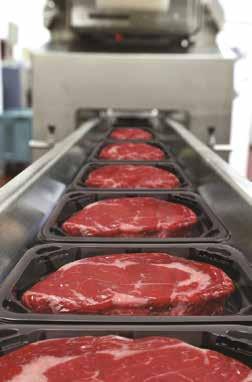
7 minute read
SUSTAINABILITY
Does plastic get a bad rap?
Plastics are not only necessary in the food arena, but they help cut down on food waste. Mike Wheeler talks to Sealed Air’s Alan Adams on the role plastic plays in the food packaging industry.
Director of sustainability is an unusual title, one that is not common within a multi-national company. But not only is that Alan Adams’ role for plastic packaging specialist Sealed Air, and he is also part of the leadership group for the company’s APAC region.
At a recent conference at FoodTech Queensland, the education director of the Australian Institute of Packaging (AIP), Pierre Pienaar, made the point that, “plastics are not going anywhere’. And he is right. The thin, mainly oil-based product has a multitude of uses in many industries including food.
“Plastic is, and will remain, in my view, really important within the industry,” said Adams. “In fact, it is probably more important than ever when it comes to reducing food waste, and enabling our lifestyle. What we have to do though, is drive it to a circular economy so we can utilise those resources.”
With China and other Southeast Asian countries declining to take Australia’s recyclables, sustainability is more important than ever. However, it is something that Sealed Air saw coming over six years ago. The then recently appointed (but now retired) CEO of Sealed Air, Jerome Peribere, knew sustainability was going to be an issue, and one that needed addressing sooner rather than later.
“Jerome came out with this idea that we should think about ourselves as a sustainability company,” said Adams. “That was controversial and confronting when you think we are predominantly a plastics manufacturer, so it didn’t necessarily resonate with the average person back then.
“However, his reasoning was sound because if you look holistically at our impact on the world, we have a positive impact on the environment. If you think what Jerome was thinking back then, it led to us redefining our vision and mission. Our vision became to create a better way of life and today this continues with our CEO Ted Doheny and our purpose statement that, ‘We are in business to solve critical packaging challenges and leave our world better than we found it’. And it is through enabling efficient supply chains for food and goods without damage, that we remove a lot of the wastage that can be created in many
Sealed Air’s sustainability director, Alan Adams.
industries including food.”
These company ideas backed up the sustainability minded Adams’ thoughts on what the future would hold. Adams was already a member of the Bioplastics Association for Australasia and served as president for four years. The

association introduced standards for compostable and home compostable packaging for Australia during that time. Adams not only talks the talk, he walks the walk.
“I have a personal zero food waste policy at home,” he said. “It makes for some interesting food, and it has gotten easier to make it zero since I started composting. But we had herb salads from time to time, and it’s questionable how nice they are. Plus we grow a lot more food of our own now.”
Adams believes that there is a disconnect between people’s perceptions of plastic and how it can also be a sustainable product. But that is because there are a couple of issues that need addressing. The main one being that the Australian recycling industry is still immature.
“The problem is we don’t have great infrastructure and sustainable recycling industry developed yet,” he said. “If you talk about what plastics are recovered and recycled in Australia – and turned into something useful, and not landfilled or shipped overseas – you are talking about 4.6 per cent of rigids
and 1.2 per cent of flexibles. It is tiny.”
How can such a perception of plastics be changed? Adams believes it will take a change in mind-set. Too often, there is a myopic view, which is not telling the real story.
“Any supply chain, or any product has three big buckets,” he said. “First is inbound resources. What are the products made from? How are they made? How efficient is that? Then you have operational efficiency. Does it do the job? How well does it do the job? Does it deliver performance? Then you have end of life. What happens to it after it has been used? Equating sustainability just to the end of life is really missing most of the picture.”
This is why he thinks Australia needs a mature recycling/circular system in place. What has also changed is how much people now rely on plastics in everyday life, especially when it comes to the food industry. Adams grew up on a farm in the middle of the North Island of New Zealand. The lie of the land was a lot different back when it came to food waste. He remembers having a shepherd’s pie on most Monday nights because it was a left-over from the Sunday roast from the day before. People rarely eat like that these days, he said. It’s all about lifestyle, too.
“We had very low food waste back then,” he said. “Can we wind back the clock 30 or 40 years ago and live that way? No we can’t. People will not stand for it. We want to have the eating experience we want but also be able to recover those resources at end of life. Otherwise, you are asking us to unwind the lifestyle we really want, and that generally ends with quite a big consumer backlash.”
How does a company like Sealed Air develop sustainability around a product that is continually under the microscope? For a start, it develops packaging solutions that can help products last longer on the shelf, such as its Cryovac brand food packaging range. If product can last longer on the shelf, then there is less chance of it being thrown out before it is eaten. Adams also realises that the way people consume food is changing.
“We have to be creative in our solutions and the recovery of the materials we generate – and plastics is a big part of it – to enable us to
Adams has a zero food waste policy at home.

efficiently have the food where we want it, when we want it and the size and quantity we want,” he said.
But do people want to eat food that is staying on the shelf longer. Hasn’t the public been told again and again, that fresh is best? Sure, said Adams, but not all foods. Back in the day, a butcher would cut the customer a piece of meat, wrap it in paper and it would be taken home to be eaten. However, new packaging technologies not only mean the aforementioned longer shelf life, but it can “fool” the meat into thinking it is still relatively fresh.
“The meat is dead when you have carved it and served it up and exposed it to the atmosphere,” said Adams. “It was as good as it was going to get at that moment. From then on, it is going to degrade. If, however, you vacuum pack it, the meat still thinks it is the bigger part of the piece of meat it used to be. Because oxygen is not getting to it, atmosphere is not getting to it so, it continues to age and continues enzymatic action.
“There are case studies that will show you that the eating experience of vacuum-packaged meat with a longer shelf life is better than MAP packaged meat. Certain cheeses like to be aged, too. In the past it has been wax coatings and wax papers and things that helped keep longer shelf life. So there are efficiencies in a lot of this as well as potentially eating experiences. It isn’t like that with all foods. I’m not sure vacuum-packing apples will make for a good experience a few weeks down the track.”
Adams knows that there is a long way to go, especially in the recycling stakes. Even though there are challenges, he knows Sealed Air is on the right track when it comes to sustainability – it is what drives him every day. “I think what is really important is that Sealed Air clearly understands – and many people don’t see this – that sustainability is everything. It’s an umbrella over everything we do,” he said. “If you look at our core values and drivers – which are about food safety and shelf-life along with operational efficiency, package optimisation and brand experience – all of those things are sustainability endeavours in their own right. But I am very aligned with it, which means I love my job and I’m very happy working towards those goals.” F











